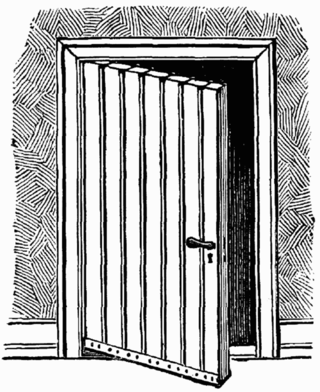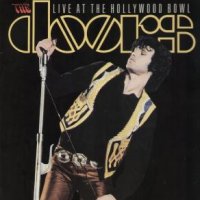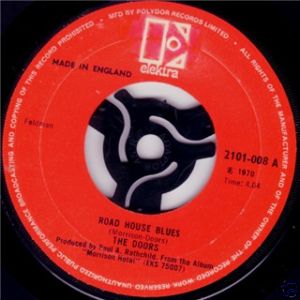
A door is a hinged or otherwise movable barrier that allows ingress (entry) into and egress (exit) from an enclosure. The created opening in the wall is a doorway or portal. A door's essential and primary purpose is to provide security by controlling access to the doorway (portal). Conventionally, it is a panel that fits into the doorway of a building, room, or vehicle. Doors are generally made of a material suited to the door's task. They are commonly attached by hinges, but can move by other means, such as slides or counterbalancing.

The Doors were an American rock band formed in Los Angeles in 1965, comprising vocalist Jim Morrison, keyboardist Ray Manzarek, guitarist Robby Krieger and drummer John Densmore. They were among the most influential and controversial rock acts of the 1960s, primarily due to Morrison's lyrics and voice, along with his erratic stage persona and legal issues. The group is widely regarded as an important figure of the era's counterculture.
Screen or Screens may refer to:

Waiting for the Sun is the third studio album by the American rock band the Doors, released by Elektra Records on July 3, 1968. The album's 11 tracks were recorded between late 1967 and May 1968 mostly at TTG Studios in Los Angeles. It became the band's only number one album, topping the Billboard 200 for four weeks, while also including their second US number one single, "Hello, I Love You". The first single released off the record was "The Unknown Soldier", which peaked at number 39 on the Billboard Hot 100. It also became the band's first hit album in the UK, where it reached number 16.

John Paul Densmore is an American musician. He is best known as the drummer of the rock band the Doors, and as such is a member of the Rock and Roll Hall of Fame. He appeared on every recording made by the band, with drumming inspired by jazz and world music as much as by rock and roll. The many honors he shares with the other Doors include a Grammy Award for lifetime achievement and a star on the Hollywood Walk of Fame.

Raymond Daniel Manzarek Jr. was an American keyboardist. He is best known as a member of the rock band the Doors, co-founding the group in 1965 with fellow UCLA Film School student Jim Morrison. Manzarek is credited for his innovative playing and abilities on organ-style keyboard instruments.

Zabriskie Point is a soundtrack album to the Michelangelo Antonioni film of the same name. It was originally released in March 1970 and features songs recorded by contemporary rock acts of Antonioni's choosing, including Pink Floyd, the Grateful Dead, and the Kaleidoscope.

Live at the Hollywood Bowl is the third official live album by the American rock band the Doors, released in May 1987 by Elektra Records. The concert was recorded on July 5, 1968, at the Hollywood Bowl in Los Angeles, the Doors' hometown.
Behind Closed Doors may refer to:

"Roadhouse Blues" is a song by the American rock band the Doors from their 1970 album Morrison Hotel. It was released as the B-side of "You Make Me Real", which peaked at No. 50 on the U.S. Billboard Hot 100 and No. 41 in Canada. "Roadhouse Blues" charted in its own right on the Cash Box Top 100, peaking at No. 76. The song became a concert staple for the group and it has been covered by numerous artists.
Strange Days may refer to:

James Douglas Morrison was an American singer, songwriter and poet who was the lead vocalist and primary lyricist of the rock band the Doors. Due to his energetic persona, poetic lyrics, distinctive voice, erratic and unpredictable performances, along with the dramatic circumstances surrounding his life and early death, Morrison is regarded by music critics and fans as one of the most influential frontmen in rock history. Since his death, his fame has endured as one of popular culture's top rebellious and oft-displayed icons, representing the generation gap and youth counterculture.

"Break On Through (To the Other Side)" is a song by the American rock band the Doors. It is the opening track of their debut album, The Doors (1967). Elektra Records issued the song as the group's first single, which reached number 126 in the United States. Despite the single's failure to impact the record sales charts, the song became a concert staple for the band.
Break on through or break on thru, may refer to:

"Will the Circle Be Unbroken?" is a popular Christian hymn written in 1907 by Ada R. Habershon with music by Charles H. Gabriel. The song is often recorded unattributed and, because of its age, has lapsed into the public domain. Most of the chorus appears in the later songs "Can the Circle Be Unbroken" and "Daddy Sang Bass".
"Treetrunk" is a song by American rock band the Doors. Recorded and released in 1972, "Treetrunk" was recorded by the surviving members of the Doors as they assembled material for their second and final album as a threesome, Full Circle, following the death of Jim Morrison. "Treetrunk" was released as a B-side of the "Get Up and Dance" single released by Elektra Records in July 1972.

Live at the Isle of Wight Festival 1970 is a live album by the American rock band the Doors, released on February 23, 2018, on Rhino Records. The concert was recorded at the Isle of Wight Festival in England on August 30, 1970, and this was released by Eagle Rock Entertainment. It was the group's final appearance as a foursome outside of the US and also the last full filming of a Doors concert.
R-Evolution is a 2013 music documentary featuring 19 live performances, TV performances and music videos by American rock band the Doors. The compilation features TV performances not previously released as well as original music videos from the 1960s, the 1980s and the 1990s. All archive footage was digitally restored and the sound was remixed and mastered for 5.1 by Bruce Botnick. It was released by Eagle Rock on November 25, 2013.

"You Make Me Real" is a song written by Jim Morrison that was first released on the Doors 1970 album Morrison Hotel. It was also released as the only single from the album, reaching No. 50 on the Billboard Hot 100, but was ultimately surpassed in popularity by its B-side, "Roadhouse Blues". In France the single was issued with "Peace Frog" as the B-side.












